- Home
- Jason Pinter
The Fury hp-4
The Fury hp-4 Read online
The Fury
( Henry Parker - 4 )
Jason Pinter
Jason Pinter
The Fury
Beware the fury of a patient man.
- -John Dryden
1
At nine in the morning, the offices of the New York
Gazette are quiet. Reporters read the morning papers, prepare to call their sources and blink off hangovers over steaming cups of coffee. Today, however, it was a different kind of quiet. The kind of quiet where everyone seems to be waiting for the roof to cave in, or the floor to suddenly give way and fall out from under you.
Every morning I would swipe my ID card, wave hello to the security guards who'd gradually warmed to me over the years and wait for the elevator with lots of other people who also looked like they'd rather still be in bed. I would exit the elevators at the twelfth floor, passing the receptionist, always too busy to acknowl edge staffers, and walk to my desk. The offices of the
New York Gazette towered over Rockefeller Center, giving me a panoramic view of one of the busiest streets in the city. Yet when I navigated the mess of chairs and debris and entered the cubicle farm on this day, I noticed the other journalists who shared my row were nowhere to be seen. There were no faces hunched far too close to computer screens, no whispered chats about the ump teenth death knell sounded for our industry. No report ers haggling over verb usage and tense like it was a matter of life or death. It seemed every day across our industry there were more layoffs, more cutbacks, more reasons to fear the end. And it had been drilled repeat edly into us by our corporate overlords and the media that if the sickle wasn't already lancing the air above our heads, it was in the midst of being lowered into place.
I couldn't worry about that. Still a few years shy of thirty, it had been my lifelong ambition to work at a pre stigious, thriving newspaper. And while one could debate whether the Gazette was thriving, in my short time here I'd had the chance to work alongside some of the greats, including my idol, Jack O'Donnell.
I'd also been wanted for murder and targeted by a deranged serial killer. Hey, who doesn't complain about their job sometimes?
Externally, you might think I looked the same. Inter nally, though, I was a different man. A man learns who he is when his life, innocence and freedom are chal lenged. I was stronger than I ever knew I could be, but deep down I wished I hadn't needed to find that out.
When I navigated the maze of empty desks to arrive at mine, I put my coffee and muffin on the desk, sat down and debated whether to ignore the silence or see what was causing the sound vacuum. I reached for the plastic tab on my coffee, but immediately thought twice.
To ignore the strange stillness of the office would have gone against every bone in my body, and probably trig gered some sort of spontaneous combustion. Curiosity not only killed the cat, but made my breakfast grow cold. So I stood back up and took a lap around the news floor to see what the hell was going on.
I didn't have to go far.
A group of half a dozen reporters were huddled around the desk of Evelyn Waterstone, the Gazette 's
Metro editor. They were talking under their breaths, worried looks in their eyes. I wondered if there were going to be layoffs. If some of my colleagues-perhaps even myself-would be out of a job. That Evelyn's desk had seemingly replaced the watercooler as center of office scoop was itself noteworthy. Evelyn stayed as far away from gossip as those who gossiped stayed away from her. Whatever happened had to be big enough to pique her interest. I walked up casually, inserting myself into the conversation through proximity alone.
Evelyn Waterstone was a short, squat woman whose haircut resembled a well-manicured putting green- only this particular green was gray with age-and whose broad shoulders would have been a welcome addition to most offensive lines. She was a discipli narian in the gentlest sense of the word. It took several years for her to warm up to me, but when my work ethic and the quality of my reporting became clear, Evelyn began to grudgingly show me a modicum of respect.
Still, I don't think you'd ever see the two of us tossing back a couple of longnecks after hours. I made an effort never to stop by her desk unless I had a specific question, and Evelyn never stormed by mine unless I'd made some terrible grammatical mistake that, to
Evelyn, was only slightly worse of an offense than treason.
"Morning, Parker," Evelyn said. She held a black thermos between her fleshy hands, and took a long, drawn-out sip. "Another beautiful day at your friendly local newspaper." She sniffed the air. "Glad to see you've begun showering regularly again."
"Morning, Evelyn," I said, nodded to the other re porters, who offered the same.
"You hear about Rourke?" she said. I hadn't, and told her so. She raised her arms dramatically as if re counting some heroic tale. "This paper's most contro versial sportswriter-who incidentally once told a linebacker he would 'whup his ass like a donkey'-got mugged yesterday on his way home from the office.
Well, I shouldn't say mugged, because the guy didn't take any money, but Frank ended up getting the donkey side of the whupping."
"Really?" I said, incredulous. "Rourke?" I had no love lost for Frank Rourke, considering the man had once left a bag of excrement on my desk-but the man's swagger seemed to come from years of always being the one guy who was able to leave the fight on his own two feet.
"Seems some hothead took umbrage to Frank's calling the Yankees 'the most poorly run organization since FEMA.' Some disgruntled asshat from the Bronx.
Anyway, this guy waits outside of the office until Frank leaves. Then he yells, 'Yo, Rourke!' Frank turns his head, and gets a sockful of quarters up against the side of his temple."
"That's terrible, is he okay?"
"Concussion, he'll be fine. Police arrested the fan,
I'm just hoping he might have damaged the area of Frank's brain that makes him such an asshole. Maybe he'll have one of those Regarding Henry kind of epiphanies and come back a better man."
"That's probably too much to expect."
"We can dream, Parker. We can dream."
As we chatted, I noticed another group of reporters huddled together in the hallway looking like they'd just been told management had decided to restructure by throwing them out the twelfth floor windows. The group shifted nervously, whispering amongst themselves.
Never wanting to be the last one in the know, I ap proached, said, "I thought Frank was going to be fine, what gives?"
Jonas Levinson, the Gazette 's science editor, said,
"Frank is the least of our concerns. Though, as a matter of fact, something has died this morning. Something to be mourned as long as we're employed by this godfor saken newspaper. As of today, good taste, my friend, has kicked the bucket."
I stared at Jonas, waiting for some kind of an expla nation. Levinson was a tall man, balding, who wore a different bow tie to the office every day. He very seldom exaggerated his feelings, so at Jonas's remark a flock of butterflies began to flutter around in my stomach.
"I'm not following you," I said to Jonas. "Good taste? Jonas, care to explain?"
"Just follow the eyes, Parker," Jonas said. "Follow the eyes."
I opened my mouth to ask another question, but then
I realized what he was saying. The eyes of every member of our group were focused on two individuals making their way across the Gazette 's floor. They were stopping at every desk, popping into each office for a few moments. It looks like some sort of introduction ritual was taking place.
Immediately this struck me as odd. I'd never met another employee during a walkaround, and had not received one myself. The fact that this one person was being given the grand tour made it clear he was someone the brass wanted to coddle.
One of the two men I reco
gnized immediately as
Wallace Langston, editor in chief. Wallace was in his midfifties, lean with a neatly trimmed beard. His brown hair was flecked with gray, and he had the slightly bent posture of a man who'd spent the majority of his years hunched over a keyboard. Wallace had been a staunch supporter of mine in the years I'd been employed by the paper, and even though now more than ever he was feeling the crunch of his corporate masters insisting on higher profit margins, he knew what it took to print good news. If not my idol, he was a good, loyal mentor.
"Is he," I said, "introducing someone around the office?"
"That is precisely what it looks like," Jonas replied.
Evelyn walked up and said, "I never met a damn person until my first staff meeting. I got as much of an introduction as my stove has to a cooking pot."
"Me, neither," I said. When I started at the Gazette,
I didn't know anybody other than Jack O'Donnell. Jack was my boyhood idol, the man most aspiring reporters dreamt of becoming. He and I had grown close over the last few years, but recently he'd lost his battle with the bottle and left the Gazette. I hadn't spoken to him in a few months. I'd tried his home, his cell phone, even walked by his Clinton apartment a few times, but never got a hold of the man. It was clear Jack needed some time alone with his demons.
Ironically the first reporter I'd met was a woman named Paulina Cole. We worked next to each other when I first started at the Gazette. Soon she left for a job at the rival Dispatch, where through a combination of balls, brass and more balls she'd become one of the most talked-about writers in the city. Paulina was cold, calculating, ruthless and, worst of all, damn smart. She knew what people wanted to read-namely, anything where if you squeezed a page, dirt or juice came out- and gave it to them. She was part of the reason Jack had left the Gazette. She'd managed to pay off numerous people in order to discover the extent of Jack's drinking habits, and then ran a front-page article (with unflatter ing pictures) depicting Jack as the second coming of
Tara Reid. Saying there was no love lost between us was like saying there was no love lost between east and west coast rappers.
Wallace was still too far away for us to make out just who he was introducing around the office, but I got the feeling he would prefer if he didn't have to do it en masse.
"I'm going back to my desk," I said. "Jonas, if you see good taste anywhere, I'll get the paddles and we'll resuscitate the bastard."
"Thank you for the offer, Henry, but I do believe it's too late."
I walked back to my desk, trying not to think about what this could mean. Since Jack left, the Gazette had been on a hiring freeze. We were in a war with the Dispatch over circulation rates, advertising dollars and stories, and our expenses were taking a toll. If Harvey
Hillerman, the president and owner of the Gazette, had hired a new reporter, he or she had to be important enough to cause a stir. Not to mention someone who would be approved of by the other reporters whose pay raises had been nixed last holiday season.
I sat down and continued working on a story I'd been following up on for several weeks, about the homeless population of New York. According to the New York
City Department of Homeless Services, there were over thirty-five thousand homeless individuals living within the city's borders. Including over nine thousand families. That number had increased by fifteen percent in the last five years.
I was about to pick up the phone, when I heard the sound of footsteps approach and then stop by my desk.
I looked up to Wallace Langston. And his mystery hire.
"Henry Parker," Wallace said, hand outstretched,
"meet Tony Valentine."
Tony Valentine was six foot three, looked to be a hundred and eighty svelte pounds and had the smile of a cruise-ship director. His hair was bleached blond, and his teeth glistened. His tan was clearly sprayed on, as I noticed when he extended his hand to shake mine that his palms were a much paler shade. He wore a designer suit, and wore it well. A red pocket square was neatly tucked into his suit jacket. The initials T.V. were em broidered in white script on the cloth.
As he offered his hand, I noticed his sleeves were held together by two gold cuff links. Also mono grammed with T.V.
Clearly this man did not want his name to be for gotten.
"Henry Parker," Valentine said, gushing insincere admiration. "It's just a pleasure to finally meet you. I've been following your career ever since that nasty business of your murder accusation. All those guns and bullets, and now here I am, working with you. Sir, it is an honor. "
While I pried the goop from my brain, I shook Valen tine's hand, then looked at Wallace. The name Tony
Valentine did sound familiar, but I couldn't quite place it…
"Tony is our new gossip reporter," Wallace said en thusiastically. "We were able to pluck him from Us
Weekly. Today is his first day."
"And not a day too soon," Tony said, pressing the back of his hand against his forehead, as though diag nosing a strange malady. "As much as I admire your paper-and Wallace, please don't think otherwise-it was lacking a certain pizzazz. A certain panache, if you will. A certain sexiness."
"Let me guess," I said. "You're here to bring sexy back."
Tony pursed his lips and smiled. "You're a clever one, Henry. I'm going to have to keep my eye on you.
So, guess what my new column is going to be called?"
"Do I have to?"
"You most certainly do." Tony waited a moment, then blurted out, "'Valentine's Day.' Isn't that a riot?"
"Better than the ones in L.A."
"True, true. By the way, Wallace told me you covered the Athena Paradis murder a while back. Is that so?"
"You heard right," I said. Athena Paradis was a professional celebrity/diva who was gunned down outside a nightclub where she was performing tracks off her upcoming album. I investigated the murder, and nearly lost my life in the process.
"Let me tell you, the day that girl died, it was like the day I learned Diana had been killed. Athena was just one more reason for me to get up in the morning. I don't think I slept for a week after that. I can't imagine how you must have felt."
"Sure," I said. "Lost tons of sleep."
"No doubt," Tony said. "Listen, Henry, it's been a pretty pleasure. We'll have to go out for a dirty martini one of these nights. I want to hear all about what you're working on. Okay?"
"I'll be checking my calendar right away," I said.
"Terrific. Wallace, on with the show?"
As Tony and Wallace walked away, I saw Wallace turn back to me. There was a remorseful look in his eye.
Immediately I knew Tony's hire was at the behest of
Harvey Hillerman. Gossip was a commodity in this town. I knew it; I'd been the subject of it. For the most part, the Gazette had kept its beak clean, relegating society and gossip stories to the weekend Leisure section. Now we would all be fighting tooth and nail to compete for page-one space with Mr. Tony Valentine. I wondered how much an embroidered pocket square cost.
After a long day I left the Gazette thoroughly ex hausted. I checked my cell phone, found one voice mail waiting. It was from Amanda. We'd been seeing each other steadily over the last few months, trying to start over on a relationship that broke from the gate too fast.
I didn't want to screw things up this time, so I was more than happy to take it slow. Dinner and movies, walks through Central Park. I sent flowers to her office, she sent me meatball subs for lunch. It was harmony.
As I put the phone to my ear to listen to the message,
I heard a strange voice say, "Henry Parker?"
I turned to see a man approaching me. He was dirty and disheveled, wearing rags that looked about to fall off his deathly skinny frame. A black briefcase was slung over his shoulder. He carried it like it either weighed fifty pounds, or he was just barely strong enough to hold it to begin with. His eyes were blood shot, fingernails dirty. His eyes glowed wide from sunken-in sockets-a skel
eton with a pulse. Despite his haggard appearance he looked to be young, in his early thirties. I'd never seen the man before in my life, yet for some reason he looked oddly familiar.
"The city's gonna burn," he rasped. "I need to talk to you."
"You can send any press inquiries through the switchboard," I said, picking up my pace.
"Are you," he said, the words coming out through yellowed teeth, "Henry Parker?"
I started to walk faster. I had no idea how this man knew my name, but from the looks of him I certainly didn't want to find out. The image of Frank Rourke- a pretty strong and belligerent man to begin with- being beaten by a crazed reader with a homemade weapon crossed my mind. In my few years at the
Gazette I'd received plenty of mail from readers. Mostly positive from people who enjoyed my stories, but still plenty from people who thought I was either a hack or still remembered all the unwanted attention I'd received a few years ago when I was thought to have killed a police officer.
It amazed me how truth was often suffocated in minutes, but lies were given sufficient air to breathe indefinitely.
"I am," I said, offering my card. He looked at it, just stared at me with those sunken eyes. I turned to walk away, speeding up as I headed through Rockefeller
Plaza. I turned back. The man began to walk faster, too.
The rubber on his sneakers was falling apart, and the gray overcoat he wore was tattered and soiled.
"Please, Henry, I need to talk to you. Oh God, it's important. You don't know what's going on. You don't know what's going on. Never seen anything like it."
Suddenly he closed his eyes and retched, a cough threading beads of phlegm through his gaunt fingers.
"Call the Gazette tomorrow," I said. I gave him the switchboard number. He didn't seem to care. I walked faster, a slow trot, but my heart began to race when I saw that the man was matching my pace.
"Henry," he said, his eyes now terrified. "We need to talk! I'm begging you, man!"
"Sorry, don't have time," I said. I picked up the pace, broke into a run and crossed the street just as the light was turning red. As I reached the other side I looked back. The man was about to race through the oncoming traffic, but then apparently thought better of it.

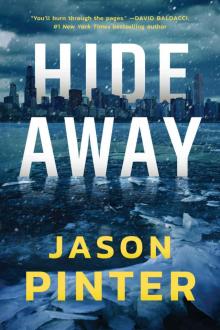 Hide Away (A Rachel Marin Thriller)
Hide Away (A Rachel Marin Thriller)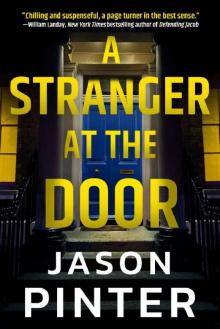 A Stranger at the Door (A Rachel Marin Thriller)
A Stranger at the Door (A Rachel Marin Thriller)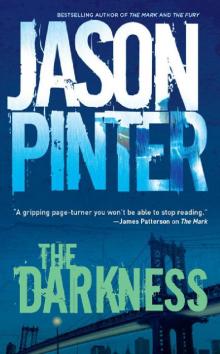 The Darkness hp-5
The Darkness hp-5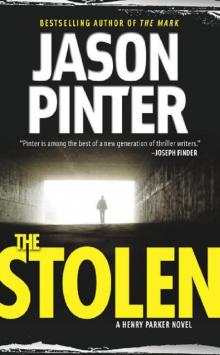 The Stolen hp-3
The Stolen hp-3 The Guilty hp-2
The Guilty hp-2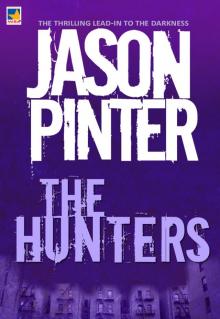 The Hunters
The Hunters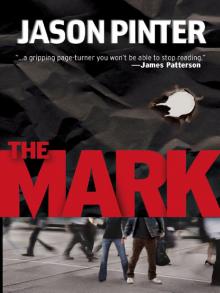 The Mark hp-1
The Mark hp-1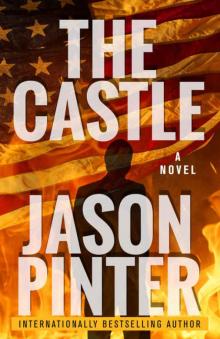 The Castle: A Ripped-From-The-Headlines Thriller
The Castle: A Ripped-From-The-Headlines Thriller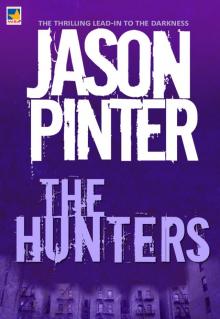 The Hunters (henry parker)
The Hunters (henry parker)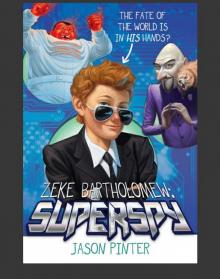 Zeke Bartholomew
Zeke Bartholomew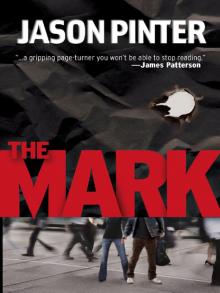 The Mark
The Mark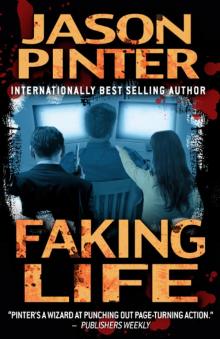 Faking Life
Faking Life![[Henry Parker 01.0] The Mark Read online](http://i1.bookreadfree.com/i2/04/08/henry_parker_01_0_the_mark_preview.jpg) [Henry Parker 01.0] The Mark
[Henry Parker 01.0] The Mark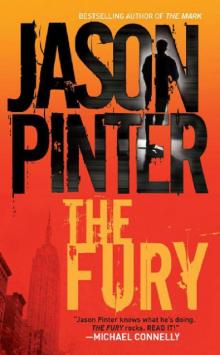 The Fury hp-4
The Fury hp-4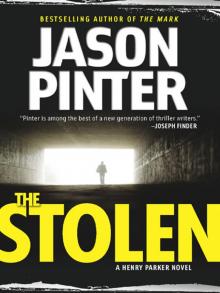 The Stolen
The Stolen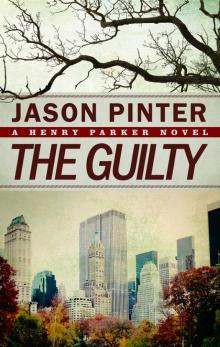 The Guilty
The Guilty